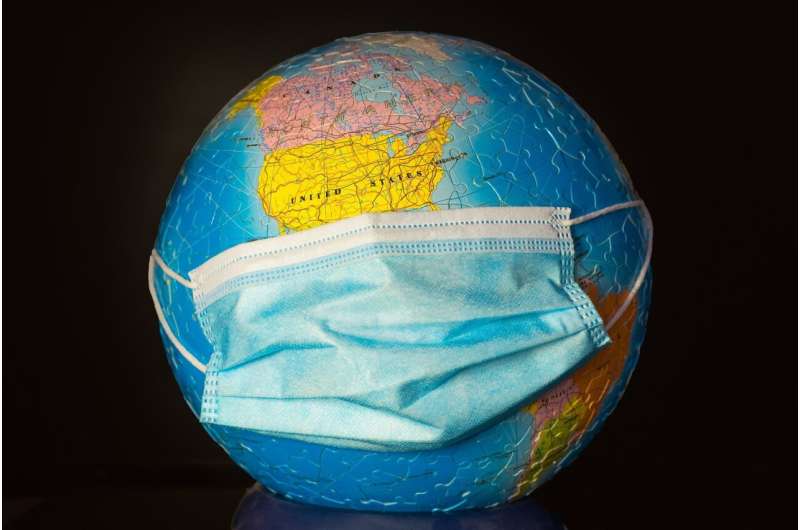Pandemic exposed major problems for resource availability and mental health wellbeing for refugees

The COVID-19 pandemic has shown there was a lack of clear access of digital resources, language barriers and adequate wellbeing support for refugees who were part of the UK's Community Sponsorship Scheme (CSS) says a new report from the University of Birmingham.
As part of ongoing research conducted by the University of Birmingham's Institute for Research into Superdiversity (IRiS) the study concluded that with the advent of the pandemic and the introduction of social distancing and lockdown in March 2020, Community Sponsorship groups were challenged to offer alternative support to refugees in new ways. As the pandemic took place emerged and evolved, volunteers, majority of whom are retired or semi-retired realized that many refugees faced language barriers or were unable to access information digitally. With some volunteers and refugees needing to shield themselves and many services moving to remote provision, these groups faced a situation very different to that for which they had planned.
The study also found how the mental health of many refugees had deteriorated as expected during the pandemic but it was more difficult for refugees as they were already experiencing psychological problems associated with experiences of conflict, loss and isolation as lockdown was overwhelming for refugees already struggling with trauma.
Some local groups did try and offer support such as introducing refugees to activities such as gardening and birdwatching to help with their wellbeing, but such resources were not available to all.
Dr. Marisol Reyes-Soto, co-author of the research from the University of Birmingham says: "The pandemic came at a difficult time for those refugees who were part of the community sponsorship scheme. Our research highlighted the problems that persisted but we have created a toolkit for both community groups and refugees which provides resources for sign-posting and concrete examples of how digital tools and wellbeing support can be obtained. It is essential to have these tools in place for refugees who have often experienced trauma and will not be left to their own devices during a critical period when they are attempting to settle in their new communities."
Having previously undertaken an independent evaluation of the UK's Community Sponsorship Scheme, the Community Sponsorship research team at IRiS identified a knowledge gap in the strategies adopted to meet refugee needs under pandemic conditions. The team reached out to Community Sponsorship groups currently supporting at least one refugee family to explore the challenges they faced and how they had addressed these challenges. Some 21 groups agreed to be interviewed, each nominating a representative of whom 17 were women and 4 men. Seven groups were located in urban settings, eight in semi-urban and six in rural locations. Eleven of the groups could be characterized as faith based and ten as secular. The majority of the groups interviewed received their families between 2019 and 2021.
Jenny Phillimore, Professor of Migration and Superdiversity at the University of Birmingham, commented: "The pandemic challenged CS volunteers in unexpected ways. Offering support from a distance, when it was designed to be in person and trying to look after the health and wellbeing of both refugees and volunteers was extremely difficult. Most groups did find a way forward and we believe their innovations continue to be useful in current circumstances. We hope the toolkit will enable the learning from the pandemic to be shared and help new groups and those in rural areas in particular to deliver the support refugee."
CSS was introduced in the UK in July 2016 to enable community groups to support the resettlement of refugee families. The Community Sponsorship approach relies heavily on the provision of face to face support to enable refugees to settle, thrive and integrate in the UK. Such support is provided by volunteers but with the advent of the pandemic and introduction of social distancing and lockdown measures in March 2020, Community Sponsorship groups were challenged to offer support to refugees in new ways. With some volunteers and refugees needing to shield and many services moving to remote provision, groups faced a situation very different to that for which they had planned.
The COVID-19 pandemic challenged Community Sponsorship in the same way it challenged all aspects of life around the world. There was a temporary hold on new arrivals and groups had to adapt the way they supported families already in the UK. Resettlement restarted in February 2021 as families began arriving again. A new chapter of Community Sponsorship began in early 2021 with the launch of the UK Resettlement Scheme. Initially the scheme is to focus on resettling those from the Middle East and North Africa region who have been waiting the longest for resettlement places but over time it will develop a broader global scope so that it can respond quickly to emergency need for resettlement.
The initiative was inspired by the Canadian Private Sponsorship scheme and was the second of its kind in the world. Since its establishment others are emerging elsewhere including variations on the model in Ireland, Italy, France, Portugal, and Germany.
More information: Community Sponsorship Scheme: Supporting refugees and volunteers during the COVID-19 pandemic: www.birmingham.ac.uk/documents … c-general-report.pdf
Provided by University of Birmingham



















